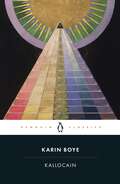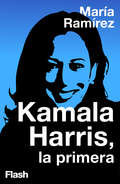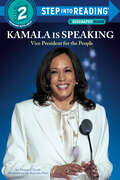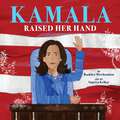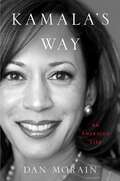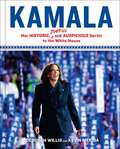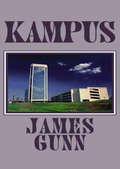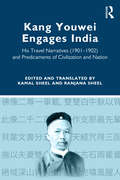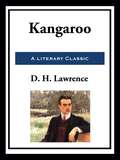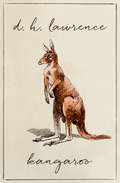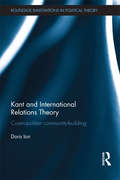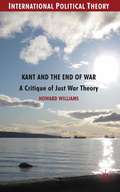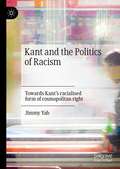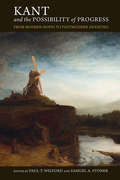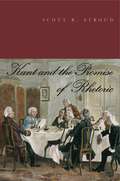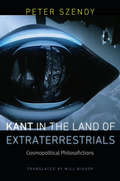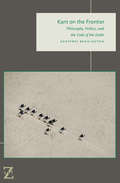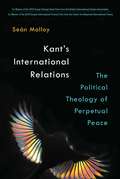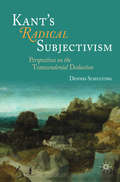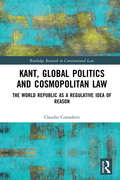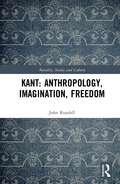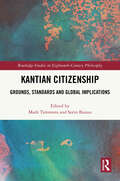- Table View
- List View
Kallocain
by Karin BoyeA pioneering work of dystopian fiction from one of Sweden's most acclaimed writersWritten midway between Brave New World and Nineteen Eighty-Four, as the terrible events of the Second World War were unfolding, Kallocain depicts a totalitarian 'World State' which seeks to crush the individual entirely. In this desolate, paranoid landscape of 'police eyes' and 'police ears', the obedient citizen and middle-ranking scientist Leo Kall discovers a drug that will force anyone who takes it to tell the truth. But can private thought really be obliterated? Karin Boye's chilling novel of creeping alienation shows the dangers of acquiescence and the power of resistance, no matter how futile.Translated with an introduction by David McDuff
Kamala Harris, la primera
by María RamírezTodo lo que necesitas saber sobre Kamala Harris, la primera vicepresidenta mujer de los Estados Unidos. Kamala Harris es una persona poco convencional y su historia representa lo mejor de Estados Unidos. Hija de una madre india y un padre jamaicano, Kamala se ha convertido en una de las políticas más poderosas de su país y en una pionera: fue la primera mujer en ocupar el cargo de fiscal general del distrito de San Francisco, la primera mujer en ocupar el cargo de fiscal general del estado de California y la primera senadora negra en representar California en la Cámara Alta. Ahora es la primera mujer vicepresidenta y muchos ya la colocan en primera línea de las elecciones presidenciales del 2024. «Aunque pueda ser la primera mujer en ocupar este cargo, no seré la última.» Kamala Harris es consciente de lo que simboliza. Este perfil es una pequeña incursión en la vida de una mujer dispuesta a cambiar la historia.
Kamala Harris: Selections from the Official White House Photography
by White House PhotographersA visual portrait commemorating Kamala Harris’s historic role as Vice President of the United States and her hard-fought run for the highest office in the land—selected from the official White House photographers and beautifully curated in the spirit of Pete Souza’s #1 New York Times bestseller, Obama: An Intimate Portrait. With an introduction by New York Times bestselling author Joy Reid.Kamala Harris has helped lead the United States through monumental crisis and change, and few have had fuller access to the most important moments in her career than the Official White House Photographers. From her four years in office as Vice President to her exuberant campaign for the Oval Office, their photographs capture American history as it unfolds.Featuring more than 200 photographs in rich full-color, Kamala Harris is the first book to gather the official photographs of Harris’s historic career. They include pivotal moments like defending the Affordable Care Act and the crisis of the COVID-19 pandemic, and solemn moments of duty, like calling Tyre Nichols’s mother in the wake of yet another murder at the hands of police. We see Harris alongside the American people, in expressions of solidarity with the queer community in her native California, and in a selfie with recent grads of Howard University. There are quieter moments, too, with her husband Doug Emhoff, and with her friends Presidents Joe Biden and Barack Obama. Harris’s own words accompany these beautifully reproduced photographs. From the White House and Air Force Two to visits with the American people in towns and cities across the country, here is Kamala Harris behind the scenes.Carefully curated by the editors of Mariner Books and reproduced to the highest standards, this visual celebration of Kamala Harris’s groundbreaking political career is perfect for anyone living through this monumental moment in American history.
Kamala Is Speaking: Vice President for the People (Step into Reading)
by Shasta ClinchYoung children will be excited to learn about the first Black, South Asian, female Vice President, Kamala Harris, and her inspiring journey in this Step 2 Biography Reader!Learn how Kamala's childhood as a biracial child of immigrant parents, her education, and inspiration from her mother helped shape who she is--someone who fights injustice and empowers the powerless. She is an inspiration herself--for boys and girls everywhere who can now see someone in the White House who looks like them.Step 2 readers use basic vocabulary and short sentences to tell simple stories. They are perfect for children who recognize familiar words and can sound out new words with help.
Kamala Raised Her Hand
by Raakhee MirchandaniEver since she was a child defending against classroom bullies, Kamala Harris has been raising her hand. She raised her hand to advocate in her neighbourhood, on her college campus, in court and in Congress. Then in 2021, Kamala Harris raised her hand and became the first woman, first Black American and first South Asian American vice president in the nation's history. This celebration of standing up for what you believe in is a powerful message to children everywhere that you can find your voice, and find the courage to raise your hand for what you believe in, too!Publishing just in time for the 2024 US presidential election.
Kamala's Way: An American Life
by Dan MorainA revelatory biography of the first Black woman to stand for Vice President, charting how the daughter of two immigrants in segregated California became one of this country&’s most effective power players.There&’s very little that&’s conventional about Kamala Harris, and yet her personal story also represents the best of America. She grew up the eldest daughter of a single mother, a no-nonsense cancer researcher who emigrated from India at the age of nineteen in search of a better education. She and her husband, an accomplished economist from Jamaica, split up when Kamala was only five. The Kamala Harris the public knows today is tough, smart, quick-witted, and demanding. She&’s a prosecutor—her one-liners are legendary—but she&’s more reticent when it comes to sharing much about herself, even in her memoirs. Fortunately, former Los Angeles Times reporter Dan Morain has been there from the start. In Kamala&’s Way, he charts her career from its beginnings handling child molestation cases and homicides for the Alameda County District Attorney&’s office and her relationship as a twenty-nine-year-old with the most powerful man in the state: married Assembly Speaker Willie Brown, a relationship that would prove life-changing. Morain takes readers through Harris&’s years in the San Francisco District Attorney&’s Office, explores her audacious embrace of the little-known Barack Obama, and shows the sharp elbows she deployed to make it to the US Senate. He analyzes her failure as a presidential candidate and the behind-the-scenes campaign she waged to land the Vice President spot. Along the way, he paints a vivid picture of her values and priorities, the kind of people she brings into her orbit, the sorts of problems she&’s good at solving, and the missteps, risks, and bold moves she&’s made on her way to the top. Kamala&’s Way is essential reading for all Americans curious about the woman standing by Joe Biden&’s side.
Kamala: Her Historic, Joyful, and Auspicious Sprint to the White House
by Kevin Merida Deborah WillisCelebrate—through stunning photographs—Kamala Harris&’s presidential run in one of the most consequential, surprising, and invigorating, campaigns in our nation&’s history, one of the most impactful ever of a candidate attempting to become the first woman president of the United States.Kamala is a beautiful tribute to Kamala Harris&’s remarkable rise from District Attorney in California to her historic presidential run in 2024. Curated by Deborah Willis and Kevin Merida, this visually captivating book features nearly 150 vibrant photographs that capture the joy, challenges, and triumphs of Harris&’s campaign. Rather than following a strict timeline, the book is thematically arranged into sections like &“Family & Early Life,&” &“The Ascent,&” and &“Powerful Rooms.&” Each section offers a unique perspective on Harris&’s multifaceted life and career, complemented by insightful essays that place this pivotal election in context. It&’s an essential read for anyone intrigued by American politics, women&’s history, and the significance of representation. Regardless of the election&’s outcome, this book celebrates Harris&’s indomitable spirit and the groundbreaking nature of her campaign. It&’s a perfect keepsake of this trailblazing event and is perfect for fans, political enthusiasts, and anyone inspired by a woman who dares to break barriers and make history.
Kampus
by James GunnThe college of the future has just one purpose: endless battle. Political organizations urge ruthless combat with an invisible opponent and each student is challenged to be more extreme than the rest. One man finds his fame by kidnapping and killing a professor. Instantly he is immersed into the world of grease-guns and grenades, where the anarchy is suspiciously formulated. The professors have forgotten their pursuit of knowledge, midnight groping at the point has turned into isolated sex with keyboards and the only goal is to compete in deadly political games. By becoming a shining example of academic excellence, Tom Gavin has tapped into the secrets inside the private chambers of the university. He finds it is either play the game or die beneath the latest revolutionary fire.
Kang Youwei Engages India: His Travel Narratives (1901–1902) and Predicaments of Civilization and Nation
by Kamal Sheel Ranjana SheelThis book is the first annotated translation of the travelogues of Kang Youwei, one of the most famous intellectuals and modernisers of late 19th-century China. These travelogues offer insights into Kang’s perceptions of India, which influenced modern intellectual discourse on India in China. These perceptions not only had a great impact on the thinking of other intellectuals but were also responsible for the larger construct that China developed about India during the republican and post-liberation period. The texts provide meaning to many dilemmas and predicaments that enshrouded the concept of civilisation and its linkages with the modern concepts of nationalism and modernity in Asian countries such as China and India. They are a valuable prism in gauging the early 20th-century intellectual and Chinese moderniser mind as it grappled with the challenges and uncertainties of those times. An important contribution to the study of Sino-Indian interactions, the book will be an indispensable resource for students and researchers of nation, nationalism, civilisation, empire, modern history, translation studies, Chinese Studies, and Asian studies.
Kang Youwei Engages India: His Travel Narratives (1901–1902) and Predicaments of Civilization and Nation
by Kamal Sheel Ranjana SheelThis book is the first annotated translation of the travelogues of Kang Youwei, one of the most famous intellectuals and modernisers of late 19th-century China. These travelogues offer insights into Kang’s perceptions of India, which influenced modern intellectual discourse on India in China. These perceptions not only had a great impact on the thinking of other intellectuals but were also responsible for the larger construct that China developed about India during the republican and post-liberation period. The texts provide meaning to many dilemmas and predicaments that enshrouded the concept of civilisation and its linkages with the modern concepts of nationalism and modernity in Asian countries such as China and India. They are a valuable prism in gauging the early 20th-century intellectual and Chinese moderniser mind as it grappled with the challenges and uncertainties of those times. An important contribution to the study of Sino-Indian interactions, the book will be an indispensable resource for students and researchers of nation, nationalism, civilisation, empire, modern history, translation studies, Chinese Studies, and Asian studies.
Kangaroo: Large Print (Twentieth Century Classics Ser.)
by D . LawrenceKangaroo is a semi-autobiographical novel by D. H. Lawrence. It follows a British writer on his visit to New South Wales. In it there are vivid descriptions of the Australian countryside and a powerful glimpse into a wartime Cornwall. Lawrence delves deeply into his thoughts on relationship, power and the people of Australia. Perhaps Lawrence&’s finest, if not most accessible, novel. "One of the sharpest fictional visions of the country [Australia] and its people".--Gideon Haigh
Kangaroo: Large Print (Twentieth Century Classics Ser.)
by D. H. LawrenceThis novel of 1920s Australia by the author of Lady Chatterley&’s Lover is &“one of the sharpest fictional visions of the country and its people&” (Gideon Haigh). A few years after the close of World War I, English author Richard Lovat Somers and his German wife, Harriet, have fled the grim remains of Europe and ventured to Australia. But they soon discover the new world is an escape from neither the demands of politics nor the nightmarish memories of Richard&’s service on the front lines. In Sydney, Richard meets Benjamin Cooley, a charismatic lawyer known to all as Kangaroo. But Kangaroo is also the leader of an underground fascist organization. While Richard finds himself drawn to the man&’s strength and certainty of purpose, he is simultaneously repelled by his embrace of dehumanizing violence. In this semi-autobiographical novel, author D. H. Lawrence plumbs the depths of his own experience in the Great War while exploring in vivid detail the breathtaking landscape and social volatility of Australia.
Kant and International Relations Theory: Cosmopolitan Community-building (Routledge Innovations in Political Theory)
by Dora IonThis book challenges popular international relations theories that claim to be based on the political writings of Immanuel Kant, and sheds new light on the philosopher's perspective on peace.Through an analysis of Kant's philosophical work and political traditions of his time, as well as of neglected concepts and theory, this book reappraises modern perspectives on his work. Kant advocated a cosmopolitan community building perspective of peace and international relations that considered issues that are now significant topics of debate such as state sovereignty and unequal access to resources. This book reveals how Kant's political views translate into a vision of international relations that cannot be associated with the democratic and neoliberal theories of peace which until now have claimed Kant's legacy. While the democratic peace theory continues to inspire policy-making, Kant's predictions on war and peace ultimately prove to be most appropriate for the current issues of globalization and diversity.Offering new insights into the meaning of peace and war in international relations, Kant and International Relations Theory is an invaluable resource for students and scholars of international relations and political theory, as well as for those interested in Kant's scholarship.
Kant and the End of War
by Howard WilliamsKant stands almost unchallenged as one of the major thinkers of the European Enlightenment. This book brings the ideas of his critical philosophy to bear on one of the leading political and legal questions of our age: under what circumstances, if any, is recourse to war legally and morally justifiable? This issue was strikingly brought to the fore by the 2003 war in Iraq. The book critiques the tradition of just war thinking and suggests how international law and international relations can be viewed from an alternative perspective that aims at a more pacific system of states. Instead of seeing the theory of just war as providing a stabilizing context within which international politics can be carried out, Williams argues that the theory contributes to the current unstable international condition. The just war tradition is not the silver lining in a generally dark horizon but rather an integral feature of the dark horizon of current world politics. Kant was one of the first and most profound thinkers to moot this understanding of just war reasoning and his work remains a crucial starting point for a critical theory of war today.
Kant and the Politics of Racism: Towards Kant’s racialised form of cosmopolitan right
by Jimmy YabThis book proposes an account of the place of the theory of race in Kant’s thought as a central part of philosophical anthropology in his political system. Kant’s theory of race, this book argues, is integral to the analysis of the “Charakteristik” of the human species and determined by human natural predispositions. The understanding of his theory as such suggests not only an alternative reading to the orthodox narrative we have seen so far but also reveals the underlying centrality of the notion of human natural predispositions in a way that is consequential for Kant’s philosophy as a whole. What is the impact of Kant’s racial theory on his philosophy and political thought? Is Kant a consistent egalitarian or a partisan Universalist thinker? Is he the symbol of racist prejudices of his time? What is the influence of his racial hierarchy on his cosmopolitan right? Or more simply, is Kant racist? From a systematic examination of Kant relevant writings, this book provides answers to these questions and shed light on two fundamental problems of his theory of race for moral philosophy, namely: (1) the completeness of the character of the White race and (2) the dispossession of the character of the beauty and the dignity of human nature of the Negro race. These two issues, unperceived from the “orthodox” reading’s perspective, however, uncovered by the “heterodox” reading, not only shape Kant’s race thinking from the beginning to the end of his life, transform his cosmopolitan right into a non-universalist form of right, but merely define Kant as a fundamental racist thinker since he developed the anthropology, the philosophy, and the politics of racism in a systematic way.
Kant and the Possibility of Progress: From Modern Hopes to Postmodern Anxieties
by Paul T. Wilford and Samuel A. StonerImmanuel Kant (1724-1804) transformed the philosophical, cultural, and religious landscape of modern Europe. Emphasizing the priority of practical reason and moral autonomy, Kant's radically original account of human subjectivity announced new ethical imperatives and engendered new political hopes. This collection of essays investigates the centrality of progress to Kant's philosophical project and the contested legacy of Kant's faith in reason's capacity to advance not only our scientific comprehension and technological prowess, but also our moral, political, and religious lives. Accordingly, the first half of the volume explores the many facets of Kant's thinking about progress, while the remaining essays each focus on one or two thinkers who play a crucial role in post-Kantian German philosophy: J. G. Herder (1744-1803), J. G. Fichte (1762-1814), G. W. F. Hegel (1770-1831), Søren Kierkegaard (1813-1855), Friedrich Nietzsche (1844-1900), Walter Benjamin (1892-1940), and Martin Heidegger (1889-1976). This two-part structure reflects the central thesis of the volume that Kant inaugurates a distinctive theoretical tradition in which human historicity is central to political philosophy.By exploring the origins and metamorphoses of this tremendously influential tradition, the volume offers a timely perspective on fundamental questions in an age increasingly suspicious of the Enlightenment's promise of universal rational progress. It aims to help us face three sets of questions: (1) Do we still believe in the possibility of progress? If we do, on what grounds? If we do not, why have we lost the hope for a better future that animated previous generations? (2) Is the belief in progress necessary for the maintenance of today's liberal democratic order? Does a cosmopolitan vision of politics ultimately depend on a faith in humanity's gradual, asymptotic realization of that lofty aim? (3) And, if we no longer believe in progress, can we dispense with hope without succumbing to despair?
Kant and the Promise of Rhetoric
by Scott R. StroudImmanuel Kant is rarely connected to rhetoric by those who study philosophy or the rhetorical tradition. If anything, Kant is said to see rhetoric as mere manipulation and as not worthy of attention. In Kant and the Promise of Rhetoric, Scott Stroud presents a first-of-its-kind reappraisal of Kant and the role he gives rhetorical practices in his philosophy. By examining the range of terms that Kant employs to discuss various forms of communication, Stroud argues that the general thesis that Kant disparaged rhetoric is untenable. Instead, he offers a more nuanced view of Kant on rhetoric and its relation to moral cultivation. For Kant, certain rhetorical practices in education, religious settings, and public argument become vital tools to move humans toward moral improvement without infringing on their individual autonomy. Through the use of rhetorical means such as examples, religious narratives, symbols, group prayer, and fallibilistic public argument, individuals can persuade other agents to move toward more cultivated states of inner and outer autonomy. For the Kant recovered in this book, rhetoric becomes another part of human activity that can be animated by the value of humanity, and it can serve as a powerful tool to convince agents to embark on the arduous task of moral self-cultivation.
Kant and the Promise of Rhetoric
by Scott R. StroudImmanuel Kant is rarely connected to rhetoric by those who study philosophy or the rhetorical tradition. If anything, Kant is said to see rhetoric as mere manipulation and as not worthy of attention. In Kant and the Promise of Rhetoric, Scott Stroud presents a first-of-its-kind reappraisal of Kant and the role he gives rhetorical practices in his philosophy. By examining the range of terms that Kant employs to discuss various forms of communication, Stroud argues that the general thesis that Kant disparaged rhetoric is untenable. Instead, he offers a more nuanced view of Kant on rhetoric and its relation to moral cultivation. For Kant, certain rhetorical practices in education, religious settings, and public argument become vital tools to move humans toward moral improvement without infringing on their individual autonomy. Through the use of rhetorical means such as examples, religious narratives, symbols, group prayer, and fallibilistic public argument, individuals can persuade other agents to move toward more cultivated states of inner and outer autonomy. For the Kant recovered in this book, rhetoric becomes another part of human activity that can be animated by the value of humanity, and it can serve as a powerful tool to convince agents to embark on the arduous task of moral self-cultivation.
Kant in the Land of Extraterrestrials: Cosmopolitical Philosofictions
by Peter Szendy“Yes, Kant did indeed speak of extraterrestrials.” This phrase could provide the opening for this brief treatise of philosofiction (as one speaks of science fiction). What is revealed in the aliens of which Kant speaks—and he no doubt took them more seriously than anyone else in the history of philosophy—are the limits of globalization, or what Kant called cosmopolitanism.Before engaging Kantian considerations of the inhabitants of other worlds, before comprehending his reasoned alienology, this book works its way through an analysis of the star wars raging above our heads in the guise of international treaties regulating the law of space, including the cosmopirates that Carl Schmitt sometimes mentions in his late writings.Turning to track the comings and goings of extraterrestrials in Kant’s work, Szendy reveals that they are the necessary condition for an unattainable definition of humanity. Impossible to represent, escaping any possible experience, they are nonetheless inscribed both at the heart of the sensible and as an Archimedean point from whose perspective the interweavings of the sensible can be viewed.Reading Kant in dialogue with science fiction films (films he seems already to have seen) involves making him speak of questions now pressing in upon us: our endangered planet, ecology, a war of the worlds. But it also means attempting to think, with or beyond Kant, what a point of view might be.
Kant on the Frontier: Philosophy, Politics, and the Ends of the Earth (Lit Z Ser.)
by Geoffrey BenningtonA philosophical exploration of Kant&’s writings on teleology, history, and politics and how the concept of the frontier shapes—and complicates—his thought. At a time when all borders, boundaries, and limits are being challenged, erased, or reinforced—often violently—we must rethink the concept of frontier. But is there even such a concept? Through an original and imaginative reading of Kant, philosopher Geoffrey Bennington casts doubt upon the conceptual coherence of borders. The frontier is both the central element of Kant&’s thought and the permanent frustration of his conceptuality. Bennington brings out the frontier&’s complex, abyssal, fractal structure that leaves a residue of violence in every frontier and complicates Kant&’s most rational arguments in the direction of cosmopolitanism and perpetual peace. Neither a critique of Kant nor a return to Kant, this book proposes a new reflection on philosophical reading, for which thinking about the frontier is both essential and a recurrent, fruitful, interruption.
Kant's International Relations: The Political Theology of Perpetual Peace
by Sean Patrick MolloyWhy does Immanuel Kant (1724-1804) consistently invoke God and Providence in his most prominent texts relating to international politics? This question animates this study of one of the preeminent philosophers of modernity. In this wide ranging study, Seán Molloy proposes that texts such as Idea for a Universal History with Cosmopolitan Intent and Toward Perpetual Peace cannot be fully understood without reference to Kant’s wider philosophical projects, and in particular the role that belief in God plays within critical philosophy and Kant’s inquiries into anthropology, politics, and theology. The broader view that Molloy provides reveals the political-theological dimensions of Kant’s thought as directly related to his attempts to find a new basis for metaphysics in the sacrifice of knowledge to make room for faith. This book is certain to generate controversy. Kant has repeatedly been hailed as “the greatest of all theorists” in the field of International Relations (IR); in particular, he has been acknowledged as the forefather of Cosmopolitanism and Democratic Peace Theory. Yet, Molloy charges that this understanding of Kant is based on misinterpretation, neglect of particular texts, and failure to recognize Kant’s ambivalences and ambiguities. Molloy’s return to Kant’s texts forces devotees of Cosmopolitanism and other ‘Kantian’ schools of thought in IR to critically assess their relationship with their supposed forebear: ultimately, they will be compelled either to seek different philosophical origins or to find some way to accommodate the complexity and the decisively nonsecular aspects of Kant’s ideas.
Kant's Radical Subjectivism
by Dennis SchultingIn this book, Dennis Schulting presents a staunch defence of Kant's radical subjectivism about the possibility of knowledge. This defence is mounted by means of a comprehensive analysis of what is arguably the centrepiece of Kant's Critique of Pure Reason, namely, the Transcendental Deduction of the Categories. Radical subjectivism about the possibility of knowledge is to be understood as the thesis that the possibility of knowledge of objects essentially and wholly depends on subjective functions of thought, or the capacity to judge by virtue of transcendental apperception, given sensory input. Subjectivism thus defined is not about merely the necessary conditions of knowledge, but nor is it claimed that it grounds the very existence of things. Novel interpretations are provided of such central themes as the objective unity of apperception, the threefold synthesis, judgement, truth and objective validity, spontaneity in judgement, figurative synthesis and spatial unity, nonconceptual content, idealism and the thing in itself, and material synthesis. One chapter is dedicated to the interpretation of the Deduction by Kant's most prominent successor, G. W. F. Hegel, and throughout Schulting critically engages with the work of contemporary readers of Kant such as Lucy Allais, Robert Hanna, John McDowell, Robert Pippin, and James Van Cleve.
Kant, Global Politics and Cosmopolitan Law: The World Republic as a Regulative Idea of Reason (Routledge Research in Constitutional Law)
by Claudio CorradettiWhy is there so much attention on Kant's global politics in present day law and philosophy? This book highlights the potential fruitfulness of Kant's cosmopolitan thought for understanding the complexities of the contemporary political world. It adopts a double methodological strategy by reconstructing a genealogical conceptual journey showing the development of international law, as well as introducing an interpretation of cosmopolitanism centred on Kant's theory of a metaphysics of freedom. The result is a novel focus on Kant's notion of the world republic. The hypothesis here defended is that the world republic stands as a way of thinking about international politics where the possibility of progression towards peace results from its use as a regulative idea.
Kant: Anthropology Imagination Freedom (Morality, Society and Culture)
by John RundellIn a new reading of Immanuel Kant’s work, this book interrogates his notions of the imagination and anthropology, identifying these – rather than the problem of reason – as the two central pivoting orientations of his work. Such an approach allows a more complex understanding of his critical-philosophical program to emerge, which includes his accounts of reason, politics and freedom as well as subjectivity and intersubjectivity, or sociabilities. Examining Kant’s theorisation of the complexity of our phenomenological existence, the author explores his transcendental move that includes reason and understanding whilst emphasising the importance of the faculty of the imagination to undergird both, before moving to consider Kant’s pluralised, transcendental notion of freedom. This outstanding book will appeal to scholars with interests in philosophy, politics, anthropology and sociology, working on questions of imagination, reason, subjectivities and human freedom.
Kantian Citizenship: Grounds, Standards and Global Implications (Routledge Studies in Eighteenth-Century Philosophy)
by Mark Timmons Sorin BaiasuThis book is a collection of 12 new essays on the topic of Kant’s account of citizenship, the first book-length text on this topic. It features an international cast of leading scholars who specialize in Kant’s ethics, philosophy of religion and political philosophy. The contributors connect Kant’s philosophy with contemporary issues concerning citizenship, including the moral grounds of citizenship rights, the relation between citizenship, human rights and dignity, civic virtues, citizenship in the ethical commonwealth, in particular the moral function of religious rituals, the link between ethical duties and faith, and the relation between religious freedom and political power, democratic participation, the legitimacy of international courts, just war theory, cosmopolitanism and the contemporary relevance of a Kantian account of citizenship.The topic is of interest given some of the currently urgent citizenship-related challenges that we are facing today. Kant’s account of justice stipulates that, in a fair and peaceful world, the legal framework that establishes rights and obligations should be effective at national, international and cosmopolitan levels. Kant’s legal and political philosophy also features the unique combination of a realistic appraisal of the human condition and powerful normative recommendations concerning action and principles of ethics and law. Together with Kant’s emphasis on the requirement of consistency, the approaches discussed in the volume are better able to orient thinking and guide action for currently urgent ethical, legal, political and social problems.Kantian Citizenship will appeal to scholars and graduate students working on Kant’s legal and political philosophy, as well as scholars from other fields who are interested in legal philosophy and the politics of citizenship.
